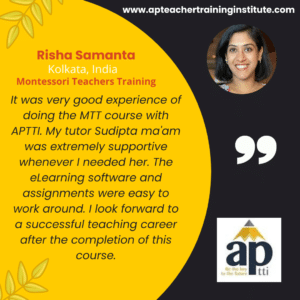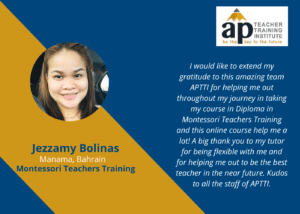Montessori Teacher Training Course for Nurturing Independent Learning in Children
The Montessori teacher training course, which takes a distinctive approach to fostering independence, is gaining popularity among both parents and teachers. This educational philosophy places an emphasis on learning via hands-on experience, self-directed activity, and cooperative play. Its foundations are found in the principles that Dr. Maria Montessori developed about education. Educators are equipped with the tools necessary to create environments in which children can develop abilities in critical thinking, problem-solving, and self-regulation through the education they get through specific Montessori teacher training courses. These fundamental components encourage self-directed learning, laying the groundwork for both curiosity and development throughout one’s entire life.
How Does Montessori Teacher Training Course Promote Self-Directed Learning?
Montessori education places a strong emphasis on the concept of self-directed learning, which is a fundamental component of the Montessori philosophy. Children are encouraged to select activities that are of interest to them in a Montessori classroom, which helps to foster an environment that fosters intrinsic drive. This is made possible by the environment that has been meticulously constructed, which includes learning resources that are easily available and intentionally built to be self-correcting. Through the use of Montessori teacher training courses, students learn how to build surroundings like this and how to support children in their discovery without providing them with direct teaching. Teachers that use the Montessori method encourage children to develop a better knowledge of the material and a passion for learning by letting them explore the material at their own speed.
What Role Do Montessori Teachers Play in Fostering Independence?
Teachers who follow the Montessori method serve more as guides than traditional teachers. It is their responsibility to monitor and assist each child’s individual educational experiences. Educators learn to take a step back and give children the opportunity to find solutions on their own through rigorous Montessori teacher training. Not only does this technique foster self-assurance, but it also promotes the development of problem-solving and analytical thinking skills. A teacher training institute frequently emphasizes the significance of understanding when to interfere and when to let the child continue exploring. This helps to cultivate a balance between providing support and allowing the child to explore independently.
Can Online Teacher Training Prepare Educators for Montessori Education?
For those who are interested in becoming Montessori educators, online teacher training has emerged as a vital resource in this age of digital technology. By providing individuals with flexible access to the ideas and practices of Montessori education, these courses make it easier for individuals to pursue their passion for teaching. Comprehensive modules that address child development, classroom management, and curriculum design are offered in online Montessori teacher training courses. These modules are critical for supporting independent learning because they cover all of these crucial topics. In spite of the fact that they are delivered in a virtual format, these classes are intended to impart practical skills that may be immediately applied in the classroom setting.
Why Are Montessori Materials Key to Independent Learning?
Through the utilization of Montessori objects, which have been meticulously crafted, students are encouraged to engage in both self-directed activity and independent problem-solving situations. Due to the fact that these materials are self-correcting, children are able to identify and repair their own errors without the need for immediate intervention from an adult. In Montessori teacher training courses, educators are instructed on how to successfully implement and make use of the resources that are utilized in the Montessori method. Children have the opportunity to develop their fine motor skills, spatial awareness, and logical thinking through the hands-on experience they have with these materials. In addition to developing a sense of independence, children are able to further develop these talents.
How Do Montessori Classrooms Differ From Traditional Classrooms?
Montessori classrooms are designed in a way that is distinctively structured to encourage self-reliance and self-motivation. In contrast to conventional classrooms, which frequently adhere to a predetermined curriculum and timetable, Montessori classrooms are adaptable and focused on the needs of the children. A Montessori classroom is designed in a way that encourages children to wander around and explore their surroundings. There are a variety of activity stations from which children can select. The necessity of establishing a well-prepared atmosphere that encourages independent learning is emphasized in teacher training courses. This type of instruction is a considerable shift from the traditional model of instruction that is directed by the teacher since it gives youngsters the opportunity to learn at their own speed and pursue their interests.
What Are the Long-Term Benefits of Independent Learning in Children?
When it comes to long-term benefits, the Montessori approach, which encourages independent learning, offers a multitude of advantages. Children have a tendency to acquire a strong feeling of self-motivation and confidence when they are encouraged to explore and learn on their own. They develop skills that will serve them well throughout their life, such as the ability to think critically and solve problems more effectively. Because these characteristics are essential for adjusting to a world that is always evolving, Montessori teacher training places a strong emphasis on their significance. Montessori education helps children become lifelong learners who are curious, resilient, and self-reliant. This is accomplished by encouraging independence from a young age onward throughout the child’s education.
How Can You Get Started with Montessori Teacher Training Course?
Participating in a Montessori teacher training course is an excellent first step to take if you are interested in supporting independent learning and want to become a Montessori educator. In order to maximize your flexibility, you should look for a respected teacher training institute that provides complete programs, including several online choices. Classroom management and Montessori pedagogy are just two of the topics that are covered in these classes. Other topics include child psychology and curriculum development. When you successfully complete a Montessori teacher training course, you will not only acquire the knowledge and abilities necessary to accompany children on their educational journeys, but you will also be prepared to design educational settings that are both enriching and supportive.
It is a transformational experience for both children and teachers to participate in Montessori education because of its emphasis on self-directed learning and independence. Teachers acquire the skills necessary to cultivate environments that foster curiosity, confidence, and a passion for learning through the completion of specialized training. Becoming a Montessori educator is a fulfilling route that impacts the future of education and the next generation of independent thinkers. Being a Montessori educator can be accomplished through traditional or online teacher training courses.





